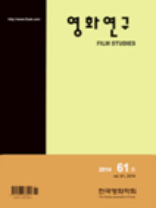- 영문명
- Cinema Novo, 1955-1971: Resisting and Subverting Reality, and Exploring the National Identity
- 발행기관
- 한국영화학회
- 저자명
- 정태수
- 간행물 정보
- 『영화연구』제61호, 297~340쪽, 전체 44쪽
- 주제분류
- 예술체육 > 예술일반
- 파일형태
- 발행일자
- 2014.09.30

국문 초록
영문 초록
During the period from 1955 to 1971, called as Cinema Novo, in thehistory of Brazilian Cinema, there was happening a something historicalscene. It was the developmental policies of President Getúlio DornellesVargas and, following this, President Juscelino Kunitschek’s policieswhich called ‘Plano de Metas’ which deepened the gap between the richand the poor, while a number of Brazilians becoming poorer. Seekingfundamentally different aims from Chanchada, big-budget epics thatimitated the style of Hollywood, Cinema Novo directly looked into suchsocial realities. Considering Chanchada films as an object to be liquidatedin the history of Brazilian cinema, the new cinema focused on screeningthe difficult situation. In addition to this, it also represented the publicexpectation of revolution and resistance against the reality. Thus, cinemawas considered as a means of reformation and revolution. A typicalexample was Glauber Rocha’s famous motto, “an idea in one’s head anda camera in one’s hand.” Such ideas on filmmaking became the startingpoint for directors of Cinema Novo which made them to go beyondscreening social problems and reach at class problems, which finallybecame a base for class conflict and revolution. However, such characteristics were to be changed fundamentally by the1964 Brazilian coup d’état. The military regime prohibited all the politicalactivities and controlled and censored all media and artistic activities. In such a situation, Cinema Novo circuitously explored crimes andirrationalities of contemporary Brazilian society rather than directly lookedinto as it did during the previous period. Moreover, it also questionedabout Brazil’s national identity, the base of which were culture theoriessuch as Cannibalism, Concretismo, and Tropicalismo that were manifestedin the commemoration of the 100th anniversary of Brazil’s independencefrom Portugal. In this paper, I have attempted to show that Cinema Novowas formed throughout such various spectrums of contents and forms.
목차
1. 개발주의와 군부정권
2. 다양한 사회이론과 새로운 영화미학
3. 현실, 저항, 전복, 민족의 정체성
4. 맺음말
해당간행물 수록 논문
참고문헌
최근 이용한 논문
교보eBook 첫 방문을 환영 합니다!

신규가입 혜택 지급이 완료 되었습니다.
바로 사용 가능한 교보e캐시 1,000원 (유효기간 7일)
지금 바로 교보eBook의 다양한 콘텐츠를 이용해 보세요!



